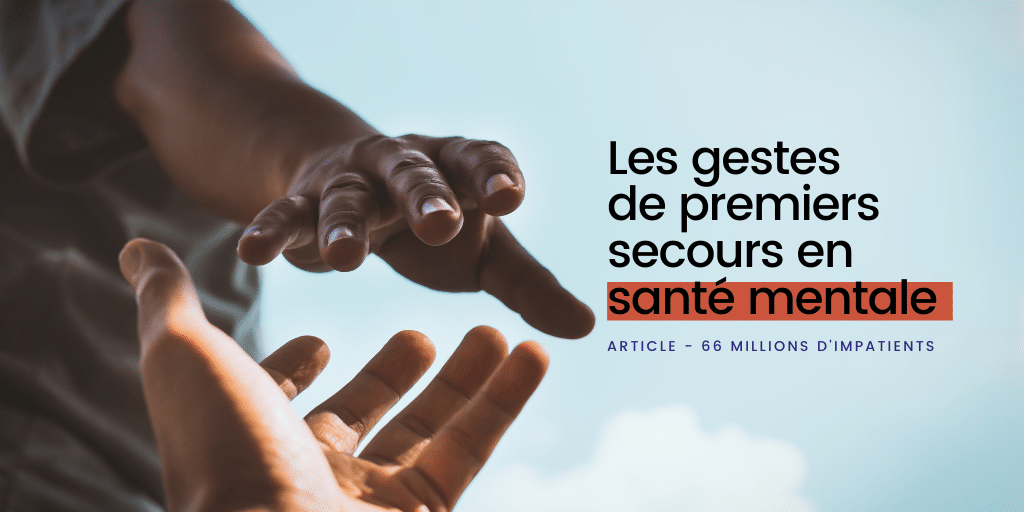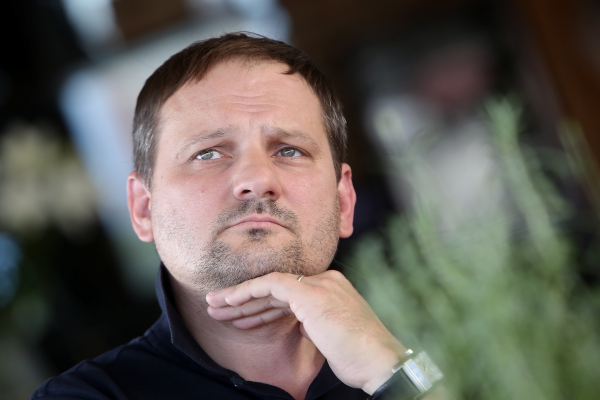Do you know how to react to a loved one who is having an anxiety attack, a stranger in the street who seems very disoriented, a colleague who withdraws and loses day after day the joy of living that you knew him? You cannot improvise yourself as a psychiatrist or psychologist in these moments, but in the same way that you can learn the first aid measures in the face of a person having a heart attack, you can learn to approach, speak, reassure a person. person who suffers from mental disorders, while waiting to hand over the baton to a specialized health professional.
This is what mental health first aid training offers. A concept of Australian origin which has been developing in France for 2 years and aims to improve the care of people with psychological suffering and also to change the outlook on these people who are so often stigmatized and rejected.
Interview with Solène Barriol, coordination assistant and communication manager at the PSSM France association (“PSSM” for “First Aid in Mental Health)
66 Million Impatients: What is the origin of this training in first aid in mental health?
Solène Barriol: Mental health first aid began in Australia in 2001 under the name “Mental Health First Aid”. They were created by a specialized educator and a professor in psychology, following the observation of a lack of knowledge of mental health, psychological disorders and a strong stigmatization of the people who suffer from them.
This training is the one we know in France. It lasts 14 hours, provides general knowledge on mental health, addresses 4 major types of mental health problems and offers an action plan that can be implemented by anyone for initial mental health assistance. This is not training for caregivers, although they are welcome. It is also and above all aimed at the general public, while waiting for the handover to adapted care.
Today this program is broadcast in around twenty countries, including France. Since the initial training, the organization (Mental Health First Aid Program) has also developed more specific modules for various categories of the population (young people, elderly people…) or professions (police officer, firefighter, lawyers, pharmacist…).
Since when has first aid training in mental health been organized in France?
In France, the organization is recent. The PSSM France association (Premiers Secours en Santé Mentale) was created in 2018 to deal with the same problem as in Australia, namely the strong stigmatization of people suffering from mental disorders, which leads to delays in the care of their care. The first training sessions took place in April 2019. PSSM France does not directly organize the training but guarantees its content: the association trains the trainers, then they independently organize the PSSM training courses. This allows training to be widely deployed since accredited trainers reside in all regions of France.
To date, there are more than 9,500 trained rescuers. Unfortunately, activity has slowed down with COVID. The objective is for the trainers to teach first aid to more than 750,000 first aid workers in 10 years and to continue of course after these 10 years, hoping that the more people are sensitized, the more speech will be “freed” and the more the sick. will be able to access appropriate care as quickly as possible.
This training is open to all?
Yes quite. It is a training where the first angle is that of citizenship. Anyone of full age can take this training. There is no need to be a caregiver, nor to have a loved one who suffers from mental disorders to be interested in it. I would even say that the further away we are from the field of mental health, the more this training makes sense. That said, it is rare that we do not have around us, in our personal or professional circle, people who suffer from episodic or chronic mental disorders. Moreover, the beginning of the training offers participants to question themselves on what precisely is a mental disorder, which will help define mental health.
This training, open to all, has been designed to be accessible to as many people as possible. It offers information that is both clear and scientifically supported. The association’s goal is to promote positive mental health, just as we do with physical health. Remember that we all have mental health, that it is more or less good depending on the periods of his life.
Concretely, when we emerge from this training what are we capable of?
To continue on the parallel with the training in “physical” first aid whose goal is to “protect, alert, help”, in our association, the watchword is “AERER”. This echoes 5 main axes:
- Approach the person
- Listen to the person, actively and without judgment
- Comfort and inform
- Encourage the person to go to professionals
- Find out about other available resources
During the training, 4 major types of disorders are addressed: depressive disorders, anxiety disorders, psychotic disorders and finally, disorders related to the use of substances. For each of them, a definition will be provided as well as content on their manifestation. For each scenario, we also address the non-crisis situation and the situation during a crisis. Armed with this knowledge, the participants practice applying the action plan (in sub-groups, with scenarios, etc.).
At the end of the training, the goal is to know how to identify disorders, behaviors that differ from the usual in order to then approach the person, start the discussion, listen to him, reassure him, talk about the care that exists, and why not direct it for professional support. It doesn’t always work on the first try. It takes time sometimes to establish contact. On the question of referral to a professional, it could be a psychiatrist, a psychologist or other types of therapy. The rescuer can also offer other available resources such as books, smartphone meditation applications, websites, etc.
The role of the rescuer is not to accompany in the care but TOWARD the care.
Is it difficult to call a mental health professional for someone? When do we know whether to take such an initiative?
In the event of a “crisis”, it is sometimes essential to call for help, if one is for example confronted with a person in suicidal or psychotic crisis. Outside of a crisis situation, the training does not recommend calling for help for someone because there is indeed the issue of consent and respect for the person. So outside of a crisis, the idea is to encourage the person to take care of himself, to demystify the idea that we have of a consultation with a psychiatrist or a psychologist because there are still many people. who fear that they will be labeled as insane or that they will be hospitalized under duress. We have to explain to them that the health care system does not work that way. In such situations, unlike physical first aid, a mental health rescuer may have to intervene several times with the same person, while awaiting the handover. This will be the case, for example, with a person around them who has anxiety attacks repeatedly and who may yet take time to decide to consult a health professional.
How much does training cost for individuals?
Trainers are free to set their own prices, since they are autonomous and independent. However, the association recommends a price of 250 euros. The association does not receive commissions on training courses delivered by trainers. On the other hand, we ask them to give each future rescuer the manual of first aid in mental health that we sell to them to finance the activity of the association.
As regards the financing, it can be taken from the professional training budget and some associations offer training free of charge, in particular thanks to the support of certain regional health agencies (ARS).
When you are an individual, the easiest way is to go and see our training calendar the dates that are proposed.
Rather, are individuals or companies registering for mental health first aid training?
Individuals and businesses register in proportions that are roughly similar. Some companies have contacted us following an unfortunate event that may have taken place at home. Unfortunately, the time is ripe for this kind of awareness.
The ideal and the long-term objective would be that in each company there is at least one person who is trained in first aid in mental health like what is put in place in physical first aid.
Are there any changes planned for first aid training in mental health?
The training currently delivered is very general and targets an adult audience who would work with other adults but we are well aware that there are various issues in mental health, and in particular concerning severe disorders, the vast majority of which develop between 16 and 25 years. We are therefore working on the adaptation of modules specifically oriented to issues that may affect young people, in particular with a focus on eating disorders or even self-harm without suicidal intentions. We hope that this module will see the light of day in early 2022.
–


